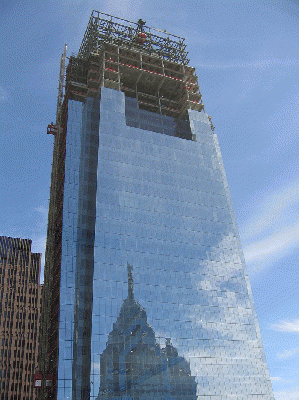Reprinted from toomuchonline.org
Why should moving data around be any different from moving people? No private party ought to be getting rich off a basic public trust.
Back in the early 1990s, the infancy of the Internet Age, our hippest policy wonks orated endlessly about the emerging "information superhighway."
But that mouthful of a moniker would soon fall out of fashion. Anyone today who talks "information superhighway" comes across as hopelessly uncool. The irony here? If we still talked about the Internet as a "superhighway," maybe we wouldn't find ourselves in the online mess that now envelops us.
Americans currently pay much more for Internet than just about everybody else in the developed world. Other countries have established fast, cheap Internet access as a given of modern life. In the United States, we surf the Net at Model-T speeds -- and tens of millions of Americans still have no broadband access at all.
This pitiful situation may soon get worse. Two corporate giants that share significant responsibility for our current digital state of affairs, Comcast and Time Warner, are now seeking regulatory approval for a $45 billion merger that would leave Comcast controlling the bulk of the nation's broadband access.
In 19 of the nation's 20 largest metro areas, the "only choice for a high-capacity wired connection will be Comcast," points out Susan Crawford, the author of last year's widely acclaimed Captive Audience: The Telecom Industry and Monopoly Power in the New Gilded Age.
So how would thinking "superhighway" help us out of this mess? America's only actual "superhighway" -- our Interstate road network -- demonstrates quite neatly the wonders we can realize once we start thinking about basic infrastructure as a public good, not a source of grand private fortune.
Historians give former President Dwight Eisenhower most of the credit for America's current Interstate system. In 1919, as a young military officer, Ike's first drive across the United States took 62 days. In 1956, as the nation's chief executive, he would sign the legislation that created the Interstate network -- and eventually cut the time of a transcontinental drive to just five days.
Every citizen, Eisenhower believed, had a "vital interest" in a "safe and adequate highway system." The federal government, under Ike, would take that interest seriously. The legislation he signed in 1956 would authorize the nation's largest public works project ever, a $25-billion, 10-year highway construction effort.
Eisenhower's entire new Interstate road network would operate under public control. No motorists had to pay a private entity anything to gain access. The ebb and flow of Ike's Interstate traffic would create no grand private fortunes.
Public control simply seemed the only way to go for Americans in the middle of the 20th century -- and not just for highways. These years would see a vast expansion of public infrastructure, for everything from recreation to education. State and national parks would soon come to dot the American landscape. A wide array of new public colleges and universities opened their doors.
What explains this golden age of publicly financed and managed infrastructure? Economic equality certainly played a prime role. By the 1950s, the nation's original plutocracy had faded away. A mass middle class, the world's first ever, had jumped out onto the nation's political center stage.
Most Americans in this new more equal America faced similar problems. Public solutions, in this political environment, just seemed common sense.
Build the Interstate with public tax dollars? Operate the Interstate under public control? Of course. Americans of the mid 20th century could see no alternative to public control over public goods.
(Note: You can view every article as one long page if you sign up as an Advocate Member, or higher).






